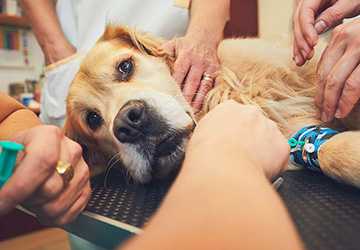
10 Most Common Pet Health Problems and How to Treat them
Hello, dear animal lovers! Our four-legged, scaly or feathered friends can be a trusted source of joy, but they can also get sick, just as we sometimes get sick. By being aware of the signs and learning to deal with everyday problems, we can give our pets a happy and healthy life. Let's start with the ten most common pet health problems and the best ways to treat them.

The most common pet health problems and how to treat them
Here are some of the most common health problems your pet may face and some ways to fix them:
1. Fleas and ticks
They may look cute and tiny, but they can be your pet's worst enemy. Fleas can cause skin irritation and itching and spread bacteria and other infections, and ticks can transmit some serious diseases, such as Lyme disease. Best defense? Regulate flea and tick control. Discuss with your veterinarian which product is best for your pet: topical treatment, collar, or oral medication. Finally, be sure to check your pet for any strange visitors after your outdoor adventure!
2. Obesity
Yes, even our dogs and cats sometimes have weight issues. Obesity is a common problem in cats and dogs and can lead to many health problems, such as diabetes, arthritis, and heart disease. Solution? Pay attention to your pet's food and playtime. Monitor their food rations by choosing high-quality, balanced meals and ensuring they have enough time to play and walk. Also, always remember that snacks should only be eaten in small amounts!
3. Dental problems
We don't neglect our teeth; why do we whiten our pets' teeth? Dental problems such as gingivitis and tartar are common in dogs. Brush your pet's teeth regularly with a pet-friendly toothbrush and toothpaste, and consider using chews and toys to keep their teeth clean. Frequent visits to the veterinarian for dental checkups can prevent early diagnosis of disease.
4. Allergy
Just like humans, animals are prone to allergic reactions. Whether it's pollen, certain foods, or even fleas, allergies can cause itching, sneezing, and skin problems in your animal friends. If your pet scratches more than usual and develops a rash, your veterinarian can help determine the cause and recommend treatment. These may include medications or a hypoallergenic diet.
5. Ear infection
While you may find floppy ears adorable, they're also the perfect home for bacteria and yeast. Ear infections are the most common problem for dogs with long ears or those who like to swim. Look for symptoms such as pain, swelling, foul odour, or ear discharge. To prevent infection, it is recommended that you clean your pet's ears with your veterinarian's approval and dry them thoroughly after bathing or playing in the water.
6. Urinary tract infection (UTI)
Just like humans, animals can be affected by urinary tract infections. Symptoms may include frequent urination, straining to urinate, blood in the urine, or accidents at home. Making sure there is plenty of fresh water and that your pet goes to the toilet regularly can help prevent urinary tract infections. If you notice any signs of discomfort or abnormality in your urinary habits, you should consult your veterinarian immediately. They may prescribe antibiotics or recommend dietary changes to help clear the infection.
7. Gastrointestinal diseases
An upset stomach is unpleasant for anyone, including your pet. Vomiting, diarrhoea, or constipation are not only undesirable, but pets can also cause significant discomfort. In most cases, poor diet (i.e. eating things you shouldn't) is to blame. To ensure your dog doesn't get an upset stomach, avoid feeding it leftover food and keep away from household hazards. If your pet has chronic digestive problems, your veterinarian can help you find the proper diet or recommend further treatment.
8. Skin problems
From dry, flaky skin to pimples and allergic reactions, our pets can suffer from a variety of skin problems. Regular grooming includes brushing and bathing with a pet-friendly shampoo; therefore, it helps keep your pet's skin and coat healthy. If you have the slightest suspicion that your pet is suffering from skin irritation, you should investigate further with the help of a professional. Your veterinarian can determine the underlying cause of the problem and prescribe appropriate treatment, which may include shampoos, ointments, or dietary changes.

9. Joint and mobility issues
As dogs and cats age, they may develop joint pain and stiffness or be unable to move as well as they once did, as they are more likely to develop arthritis or hip dysplasia. Providing your cat with a comfortable place to sleep, with soft bedding, and having food, water, and a litter box available can increase their comfort. Additionally, exercise and a good diet will help prevent your pet's joints from being overloaded. Your veterinarian may also prescribe nutritional supplements or medications to reduce pain and improve mobility. Therefore, if you notice any symptoms of joint problems, consult him immediately.
10. Behavioural problems
Behavioural problems are not typically health problems, but they can seriously impact your pet's health and quality of life. Fearfulness, anger, persistent barking, or destructive behaviour may indicate a problem that needs to be addressed. Adding enrichment activities, such as educational toys, interactive games, and obedience training, into your pet's daily routine can keep them focused and help reduce boredom and anxiety.
Wrap Up!
As loving pet parents, we not only love and care for our dog or cat but also take care of their health and well-being. Education, early detection, and prevention are vital to pets' health and well-being. By understanding common pet health problems and taking proactive steps to prevent and resolve them, we give our pets the best chance of living long and happy lives.





